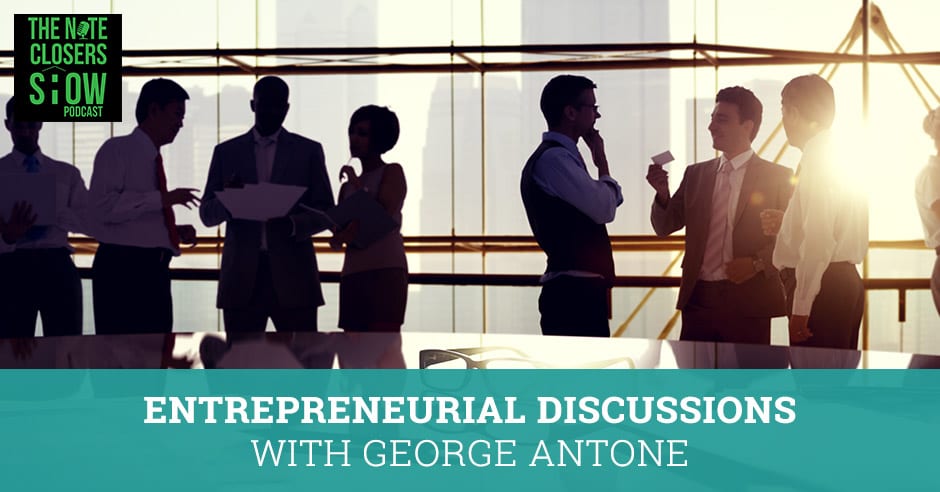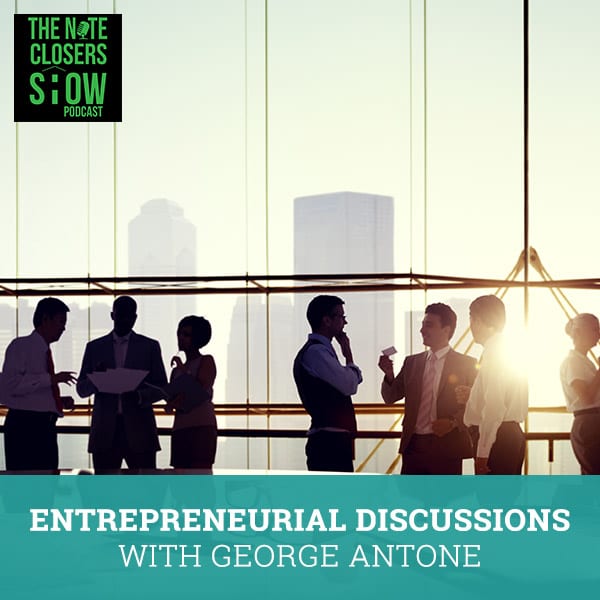
—
Listen to the podcast here
EP 456 – Entrepreneurial Discussions with George Antone
I am excited and jacked up to have our good buddy, George Antone, joining us from California. When I reached out to George and said, “Do you want to be on?” He was like, “Yeah, what are we going to talk about?” I was like, “I don’t know. We’re just going to have two guys on time.” What’s going on, George?
Thanks for having me. I look forward to having these fun chats with you and talk about anything and everything. Thanks for having me.
It’s always an honor. We should talk a little bit more often because we usually walk away with some good ideas for each other.
How are you doing?
I’m doing good. I can’t complain. Life is good. We are busting our butt with a lot of assets off. I’m looking at buying some new assets and just closing off some stuff. The podcast is rocking. I’m trying not to travel as much and trying to have a life.
What are you working on these days that you’re so fascinated by or you’re excited about like a secret project? I want to turn this whole interview. I want to ask you the question. Tell me something you’re working on that you’re super excited that you want to share with the world, but you’re not ready. Give us a sneak peek.
This was back when we were in Las Vegas. For most people that didn’t know me growing up, I wanted to be the next Dan Patrick or Keith Olbermann on SportsCenter because SC stands for Scott Carson. It’s not SportsCenter, it stands for Scott Carson. Going to school, I ended up going a different route into business and got into the business. I enjoy business and I enjoy entrepreneurship, but I was a radio DJ one semester in my early year and did theater arts in college and stuff like that. I’m a big believer that everybody runs an immediate company whether they believe it or not. You run a media company and I run a media company. It has come to that way now. It’s not the same old way of doing business, sending out postcards, door knocking, or doing a lot of stuff. You have to think differently.
We’re working on the note side of the business. We’re doing our online Commercial Note CAMP. It’s going to focus on commercial assets because I don’t think a lot of people are spending their time in there. Everybody is trying to teach about residential stuff now. Nobody is teaching on the commercial side of the ballgame and that’s where I cut my teeth initially back over a decade ago. We’ve got that coming up and we’re excited about that. We’ve got some great speakers. I had Dave Foster on from 1031 Investor and he’s going to speak on there as well. That’s exciting business wise. I get excited about stupid geeky marketing stuff. I had a coaching call with our students about geotargeting and using Instagram to market to an event. That’s why I asked, “When are your next events, George?” I can market to those people from any location. I can be a fly on the wall but I don’t have to be there. That’s one thing that we’re doing. I’m always trying to constantly cut down days in the road if I can.
I’ve been toying around with it for a little bit. I like that fact that I could be on a plane flying somewhere and sign up a marketing campaign for $10 a day for a three-day event at any numerous locations across the globe doing that or driving in your audiences to our podcast or things like that. I’m the mad scientist when it comes to how we can leverage this to drive more engagement, not only for us but something that I can bring to my good friends.
Let’s go back to the word when you said everyone has a media company. You’re talking about being a marketing company, leveraging social media, and leveraging different mediums.
We’re all in the business. I don’t care if you’re teaching finance hacks, selling credit repair or selling a house. It’s all about getting there in front of your ideal clients.
That’s what gets you going. It’s the whole marketing. I’m the same thing with finance. I geek out over challenging everything out there in terms of finance and trying to find ways to hack it. I’m working on some fascinating things that I’ll be launching at the end of 2019. I’ve been able to find some amazing stuff, but the problem is it requires a lot of calculations, the rates of return and all this stuff. What happens is I’m building it into a software that does advance stuff but keeps it simple for the user to use. I can tell you it’s fascinating stuff. You’re into the marketing side, “How can I get the word out there?” For me, I don’t care. I just want to sit in front of my computer and focus.
I was the same thing. I want to sit in front of my computer too. I have a green wall behind me. I want that beach. I want the seat to keep coming in. I know you’re big on goals in helping people when you have an end in mind. That’s the biggest thing I want to focus on the next few years. It’s getting to the point where we are spending more time somewhere tropical. Don’t get me wrong. We have a good time. We travel a couple of times a year and have fun. We’ve been very blessed to speak to someplace. You’re excited and you’re going to Branson, Missouri and speak in Branson.
I am excited about that. It’s just that the weather is going to suck.

Fynanc: Most people in life don’t realize that you can develop solutions with what you have especially these days with the internet and stuff.
You talked about the software you’re working on. I’m excited to hear that. That’s the thing. It’s making little subtle tweaks to see that dial move at the very end.
This is going to revolutionize investing in a whole different way. I know it sounds crazy and bold, but wait until you see it. I’ve shown it to one or two people. It’s the first test version. These people are advanced and they were blown away. I’m cleaning it up. We’re creating a newer version, but I’m dying to show it to you first to make sure I get your approval and then launch to the world. I can promise you it will change the way investing is done, especially in real estate.
You better let me know. We’ll be glad to put our media marketing behind it for sure to help you with that and make some subtle changes there.
What’s new with you? What have you been up to these days?
There’s not much. I’m a note geek at heart. We’re here buying and selling assets and that’s about it. We’re working through our deals, sell stuff off, buy and sell off. We’re moving to a new office space. We’re excited about that. We’re lucky we’ve got a great staff. One of our girls is going to start working from home three to four days out of the week, which is nice. She does a tremendous job. We are toying with the idea of adding another asset manager to help our students with their asset management on their assets. That’s one thing that we’ve been toying with for a little while. We’re helping people out with that. I’m very blessed we’ve got a great asset manager who works remotely for us and she does a tremendous job. She looks for ways to save us money too, which is a beautiful thing for having somebody who’s on your staff. She’s like, “Can we stop using them because I can do that here and do it cheaper now?” I’m like, “Can we do that yesterday?” It’s amazing and it doesn’t always happen because finding good people is hard to find. That’s the biggest thing that comes down to it.
We just wrapped up our 22nd Note Mastermind and we had 40 people attend. We had a few people that had to cancel the last minute. The thing that gets me excited more than anything else that gets me fired up outside of my own stuff is when I am talking with our students or talking with people who are having great success in what they’re doing. I have a big heart as well too and I know you feel the same way when you’re talking to your clients, your students, your mastermind members. When they’re coming, a light bulb goes off. It’s like a big ding in their head.
One of the things that I find fascinating is how much we learn by having people ask the right questions and also learning from different things that normally wouldn’t have happened to us. I have to share this story with you. There was a gentleman that asked me a question. I paused and I realized how much wisdom was in his question. I answered it though and he got what he wanted. I went back to my room and I couldn’t stop thinking about the wisdom in his question. What he never realized is how much I learned from his question. I researched and I ended up writing a book on it. It was that impactful to me. There are thousands of students learning certain things from me all because of this one question. I’ve had a few people asked me some amazing questions. We love seeing the success stories, but also we grow with them and that’s something we love doing.
Somebody asked me, “How do you know all these sites for these marketing things?” I’m like, “It’s the fact that I’ve had a lot of students that went out, did something and shared it with me and I made a note of it.” Good people provide a lot of learning just as much from their students as they are teaching them. What’s been the biggest lesson you’ve learned from one of your students, George, that you’re thinking about?
One thing I learned, in general, is how many people hold themselves back, the mindset. In the beginning, I never believed that mindset was important and now I think it’s everything. I realized how much people hold themselves back. You’re going nuts if you do this one, two, three. They’re so stuck on before even starting step one and they’re creating all of this stuff. I’ve become such a big advocate of personal development and mindset and all that stuff because of that. Every now and then, when I try skipping that step, it always comes back to hunt me and I see why it holds people back. That has been the biggest surprise. I’ve always been the type of person who keeps moving forward. We all have our stories. We all have our doubts and fears, but it doesn’t hold me back but I see how much 80% to 90% of the people out there. That to me has been the biggest a-ha. How about you?
One of the earliest lessons I got in life, especially what I’m doing now is doing more. Sometimes we have students with challenges because they’re like, “What about this?” I’m like, “If I take my self-doubts out of the deal and do more, buy bigger, make more offers, work that extra 5%.” Many people don’t put into things that extra 5% or making phone calls or spend a little five more minutes on the office when everybody is rushing out. That little extra 5% goes a long way in the long run of things. I’ve always learned more from my failures and missteps than I have from my successes. When I’m talking to people that come to my class, I’m like, “What are you doing here? What are you doing in my class?” That whole of learning to gain knowledge, learning for self-improvement, you should never cease to stop going because that’s the only way that we stay ahead of the curve with what we’re doing. It helps us to stay driven. If we get in the same thing that we’re doing over and over, it gets dull and we start to slip.
If I’m not always challenging myself and learning something new, I get bored and I stop getting excited about showing up. It’s important to me to always be learning and challenging myself. I’m always getting into things and new investments because I love the learning part. It’s not even about the money anymore, for me. It’s about learning, challenging, growing, but the result of doing well should be the money. It shouldn’t be the primary goal. I try to focus on one or two big deals a year and that’s it. I don’t try to do a lot of deals anymore. It’s just one or two big deals that have to generate an incredible return. That’s what keeps me excited about things. I do everything I can not to add more stuff to my plate. In fact, I’m working on a project right now on a venture, I’m trying to get my kids involved in. It should generate somewhere between $30,000 or $40,000 a month. I’m going to do eight of those over the next few years and I’m trying to get people involved. It’s fascinating stuff, but it has to be something impactful. It’s something that will help the community and something that will help whatever. This is what drives me right now and I love it.
You can have community involvement or do something to help you. That gets exciting for things. We do a lot with the military, we’re donating to a lot of our classes, donating to a lot of people and helping them any way we can for stuff. Steph is a big contributor to the pet rescue community. I’m a huge advocate of that. I joke around with her a lot of time like, “Can I punch a few holes in a FedEx box and throw a cat in there and ship it overnight?” She’s got such a big heart. She had a big rescue where she dropped to Dallas and picked up seven cats in these containers and drove them back South here to this feline cancer thing. It turns out Austin has this Austin pets’ alliance or whatever it is. It is one special department for feline leukemia cats. She picked up seven of them and came back. They’ve all been adopted out here and executed in a kill shelter. That’s her niche and she loves it. We’ve got three cats and it looks like we’ve got a fourth one staying with us permanently now. She’s trying to transport where the person walked away. We don’t have kids.
The lesson there for everyone is there’s so much fulfillment in making an impact or something that makes a difference in your community. We talked about money on some of these things. Money is important and all that, but what gives you fulfillment is not the money. You have to combine that with impact. You find to have something that gives you so much fulfillment. We have a lot of students that I push them to go out and do certain things, whether it’s for veterans or whatever it is or helping younger kids and stuff, getting them into entrepreneurship. There’s so much fulfillment in that. If people started with that before investing, it could make that journey so much more interesting.
You can have a passion or something that drives you from being emotionally connected. We’ve got a buddy Scott Dilley, who’s a note investor who runs an orphanage in Haiti. He completely finances his orphanage with 20 to 30 plus kids. That’s his big driving line. He’s a quiet guy originally from Australia.

Fynanc: There’s so much we can learn by asking the right questions and learning from different things that normally wouldn’t have happened to us.
There’s a book I’m looking at for that I would highly recommend for everyone. It’s called The Power of Significance. It’s one of those small books. It’s white and blue. You can look it up on Amazon. It’s an excellent book. It is so inspiring and I highly recommend it to everyone. You’ll read a lot about that. There’s another book also called Halftime. It’s an excellent book on significance.
For those that don’t know who George is, he is the chief nerd behind Fynanc.com. He’s also the author of the bestselling book, The Banker’s Code. He’s also the author of The Debt Millionaire.
Did you read that book, by the way?
I’ve got a couple of copies here. I read it. It was great. I love this so much. I sent 100 copies of this out to our members. Everybody loved it too. You should have seen it being plastered across social media. I have 100 people that read the book. You’ve got copies back there. Leaders are always reading too. I see a lot of the books and I’ve got a good bookshelf here behind me. Steph and I have got a lot of books at the house. Everybody watches a little bit of TV. We talk about movies here. I’ve got a book in from somebody that we’ve got through. There’s another book in from another investor. She sent me a book called Buy Homes Not Shoes. I read it. I love getting books in the mail. If somebody has got a book in, we’ll take a quick read onto it. I’m a speed reader. I dive into it and try to spend 30 minutes to an hour a day reading on some stuff if I can. I’m not quite like Warren Buffett, where he spends five hours a day reading. I would love to have his bottom line. If that’s what it takes, I will spend twelve hours a day if I have that bottom line.
Someone sent me an article about him and how he started. He had raised over $100,000 from friends and family many years ago, which is the equivalent of $1 million now. It shows the importance of knowing how to raise capital and how to structure the deal so there’s a low risk that he doesn’t lose the capital. I find that most people can do one or the other. They can raise money, but they screw it up losing money or vice versa. They don’t have to raise some money, but they know how to invest it safely or whatever. Having the combination of both is so critical. For people reading this, the big thing for everyone starting out is to take the time to learn how to structure things correctly, but also how to raise capital. What would you say, Scott, would be the biggest lessons for you that you would share with someone starting out?
Learn exactly what you’re talking about and don’t shy away from the elephant in the room questions. Something goes wrong all the time. There’s never been a deal that’s been 100% straight to the point. I’ve only had very few of those. There’s always something that drags on a little bit longer. The value doesn’t come quite back at what you expected or the borrower drags out the foreclosure process. You’d have to have plan A, B and C. Be prepared to answer those questions and don’t be afraid to say, “I don’t know.”
One of the things I have my students do is prepare with what’s called a risk management table. A risk management table is three columns, it might be four. One column is all the risks that can happen in an investment. I have them brainstorm and write down all the different risks first and then the two other columns are risk mitigation. How do you mitigate the risk? How do you lower the risk or eliminate the risk? The last column is a contingency plan, which is what do you do if that risk happens. Sometimes we add a fourth column, which is how likely is that to happen. This risk is low, medium or high. Having them do this exercise helps them so much and they do it one time per asset.
If it’s a real estate rental property, they only have to do it one time and they keep using that anytime they’re raising money. What it does do is it helps them answer any hard questions that could come up with like, “What do you do if the market goes down?” We have to have an answer ready. “What happens if this happens?” By having this very comprehensive list that’s done one time, it helps them raise so much more capital. It helps them also build confidence in themselves because now they know what they’re going to do. Part of the uncertainty and part of the fear I find with most people and most investors is not knowing what to do in case something happens. That whole process might take a few days or even a week, but it has an impact for a lifetime. It’s important to have people go through that exercise. It’s such a powerful one.
Know what to do, go through it, work through it, and know what your options are. Don’t sit here and let fear keep you from asking questions. That’s one of the things I try to reiterate. If you have questions or something is going on, get somebody involved early and not later on. If you don’t know the answer, say, “I don’t know, but we’ll find out. I’m going to call this person.” That is one of the things that is such a great thing about what you do and similar about what we do. The network of students works well together.
One of the things I have my students do and everyone should think about this is, answer this question because everyone is going to be either thinking it or going to ask you. This sounds like it has a higher risk. You should be able to answer a very well-scripted answer how to have that. I’ll tell you that that’s the first thing I teach my students. How do you answer that question? By having all the right documentation and metrics, we’re not talking about just bluff. We’re talking about very specific metrics and saying, “Here’s how we handle that and here’s our five-tier approach to doing that.” When you start with that answer and you know it inside out and it’s all documented for your investors, it will build so much confidence in you and in your investors.
One of the things I do in class is I turn to the student and I say, “What happens if the market goes down?” They always talked with this “ah” and then they say whatever it is. That hesitation created a lack of trust because the money person is going to be thinking, “This person is making this stuff up as he’s sitting there.” If he says, “It’s on page nineteen,” and then he walks you through our strategy to handle that and it’s all documented, it builds so much confidence. I literally have my students document that, but also I have them go practice raising money. I’m simply talking about the downside. We’re not talking about the upside. They say, “Here’s what we’re going to do. Let me show you how we’re covering the downside.” The fact that they can cover the downside gives them so much leap forward in terms of raising money. I find that fascinating that most people focus so much on the upside. I taught people to start by focusing on the downside, have the answer, and have everything documented. It’s not that much. It’s a few pages and built so much confidence in people. What do you think of that?
I think you have to do that. What’s the worst thing that can happen? Everybody focuses on the best possible thing that could happen. Nobody focused on the downside and they’re like, “That’s not going to happen.” It does happen. Focus on the elephant in the room.
That’s a big step. I know a lot of investors freak out about it like, “You’re being negative, George. Why do you think of the downside?” That’s what the other person is thinking. That’s why.
We all have to realize that it’s going to happen somewhere in between. You are never going to have the worst possible situation and you are never going to have the best possible situation. You’re never going to have the highest comp. You’re not going to have the fastest foreclosure. You’ve got to focus on the difference. I crack up about it because I see a lot going on in the market. A lot of people are diving in and buying stuff at a premium with the market being high thinking, “This is going to work perfectly, especially on the multifamily side. We’re going to buy a lot of multifamily and get it reidentified. The value adds within three years. We’re going to get bank financing and get cashed out.” There’s no guarantee that it’s going to happen in three years.

Fynanc: Take the time to learn how to structure things correctly, but also how to raise capital.
I look back at history and what we saw a decade ago, a lot of people thought that beforehand until the market crashed. The banks wanted to bring an additional 20% to 25% to the table to refinance them out because the equity’s gone away. A lot of people are sitting around cash in the market trying to figure out where they want to go and what they want to focus on. Either it’s an up market or down market, there’s money to be made. You just have to do some research. One of the things that I love and that I learned from you when you came into Austin was you building and creating your own credit default swaps by buying shorting stock.
Let me expand on that for the audience. What I was talking about is taking part of the income coming in from whatever the asset. The example I was giving is real estate. If you buy a real estate and you raised 20% down, the idea was that it’s all the cashflow and you buy put options on stocks that highly correlate, I stress the word highly correlate, with the recent market such as developers. Not banks, but real estate builders, developers, KB Homes, and things like this. What you do is buy a put option on their stock and these are what’s called the long-term put options. What happens is if the market tanks, you might lose money on the down payment, but you offset that with a huge gain on the put option. Every six months or so when you’re buying these things, you’re losing the premium, but you know your real estate is stable. What we do is we have an actual spreadsheet that helps us calculate and ends up being cheap to buy these things because it has to drop a lot. It comes out of some of the income so it’s a great way to track our principal or down payment.
We’ve got to do that as well. We’re excited about that. That’s one of the things I like bringing you in and other people in as we get together. You spend time visiting and you’re learning nuggets like that across the board on different things.
What would you say are key pieces for your students to have in place for covering the downside? Do you have anything you want to share?
First and foremost, buying right is the right thing. Stick to your guns. There are a lot of people that are overpaying for assets and it’s the first thing. Don’t be afraid to walk away from a deal. It doesn’t hit the numbers. Usually, the fact that we’re buying stuff at 50% of value asset gives us flexibility in case it does start to drop and be prepared. Have a couple of different exit strategies. That’s the big thing. If it gets re-performing, that’s great. If it can be sold, that’s great. Sometimes what’s going to be the fastest velocity capital saves you from a lot of risks and stuff like that.
The third thing is, don’t try to do it all yourself. You have to rely on vendors. You’ve got to rely on professionals to go do their job. I speak from the voice of experience when I first got in, I tried to do everything myself and I wasn’t an expert. I’m a jack of all trades and a master of none. As Henry Ford did, he’s not the guy going up there riveting on the Model T. He had the best people doing the job that he wanted to and he directed them. That’s what everybody has to do. You want to hire the best when it comes to asset protection. You don’t want to skip on the insurance side. Those are two of the most focal points because that’s the downside aspect of things.
You may all know about notes, or all about fix and flips, or all about apartments, but it’s the asset protection side that will CYA, Cover Your Assets when something goes wrong. A lot of people had bad things happened to them a decade ago. Everybody went through financial hiccups, foreclosure, short sales, bankruptcy and things like that. You have to realize that most of the people that have done amazing things in this country have also gone through bad times. Not everybody is perfect. Just dust yourself off. Pick it up and figure out, “What can I dive into now?” There are plenty of ways to do it. I heard one of my buddies, Greg Reid, talked about seeking counsel versus asking advice. Seek counsel, not advice. Most of us, if we’re going to something new, we ask advice from all of our friends and family members who have no clue on what we’re talking about. They have no experience. Advice is like a-holes. Everybody has got one and doesn’t know if it’s right.
If I were going to build a home, I wouldn’t talk to my sister who’s ever built a home. I wouldn’t talk to the guy across the street who was a mortgage broker. I would go to the builder. If I get sick and I have cancer, I’m going to deal with the cancer specialist and not hair transplant specialists. We get so scared and intimidated on new things that we don’t want to ask. Most successful people or people in the best of their craft are often the most willing to share with you so that you do not make the same mistakes that they can.
Scott, let me ask you one last question. I have to ask you this. What is your biggest fear? What is the big fear that a few people know about Scott Carson?
The thing that keeps me up at night is that I’m not giving enough. It comes from the point where I was down early on in life, going through a divorce, facing foreclosure, and things like that but that doesn’t scare me to fail. I’m not scared of failure. That’s not what I’m scared of. I can fail. I can make money no matter what. I typically mean social media or pop up dolls or whatever it is. I prefer the note game. The thing that scares me more than anything else is that I’m not doing enough and not giving enough. That’s why I’m always trying to share stuff. I keep thinking there’s somebody out there that I can impact if I just give them the tools. I’m a big believer that if you give them the tools, those that want to help will go out and do it.
Be selfish and tell me what’s your fear. I’m dying to know because I’ve known you for many years. You’re an incredible guy with a big heart. You’ve impacted so many people. For anyone that hasn’t met you in real life, you are an incredible person. I want to know what is Scott Carson’s fear of something internal about him.
My dad was diabetic. He was 40 when I was born. He’s a little bit younger than me. He didn’t take care of himself. He was diabetic and he had a couple of heart attacks. His last two years were miserable. His heart was pumping 17%. He passed when he was 69. It’s one of the things that drive me. That’s why I’ve been such a big health kick and trying to do things differently, not traveling, working out, and changing my diet because I want to be around for a long time. I don’t want to have a health thing like that. I don’t want to have a heart attack. My heart is not pumping. I don’t want to die in the middle of the night. I want to live as long as I can and I want to soak up as much as this little round rock will allow for us. That’s what I want to do. I don’t want to be sick. That’s some of the biggest driving factors on why I’m working out every day at noon. I’m trying to cut out all the red meat then I diet if I can. I’m not a huge health kick. I still like my cheeseburgers, double meat and double cheese from Whataburger every once in a while. That’s the thing that scares me. I don’t want to go through that. I’m trying to do everything I can to avoid that.
Have you talked about this on the show before? I just noticed you got emotional there.
My sister was getting married and my dad was already in bad health. I remember driving around as we were doing things and he asked me to be the guy that unplugged him if something happened. He didn’t want to do it, but he put it in my hands to pull the plug. My dad said, “I’m dying a very wealthy man because I’ve got such great kids who are doing great things.” He goes, “There are things that I wish I would’ve done that I didn’t get a chance to do.” That’s the words that popped in my head. Not doing things. If I have an opportunity to do something, I go do it versus sitting back.

Fynanc: When you buy long-term put options, if the market tanks, you might lose money on the down payment but you offset that with a huge gain on the put option.
Is there something you want to do or a bucket list that you haven’t done?
I’ve been to skydiving a couple of times. We’ve written a book. Maybe I’d do a novel. I like to travel more. I want to go to more countries as much as I can. I enjoy that. I want to see the world. I always think you appreciate more what you have when you do not see the world. Secondly, I have this weird idea of walking across the country. I’ve met a couple of guys that did that where they walk across the United States. They went all Forrest Gump on everybody.
How long did that take?
It took them about eight weeks to do. They walked, not run. They probably jogged a little bit of it, but they walked across the country. They got sponsorships. They get some stuff set up for that but they walked across the country from East Coast to the West Coast. I would do that at some point. I always enjoy that part of force companies running through and seeing the hills and the sunrise and stuff like that. It would be fun. You’d meet a lot of interesting people along the way. If you put a cause behind it, you could raise a lot of money and do some good for whatever cause it was. Is there anything on your big bucket list, George?
I’ve checked off a lot of things. A lot of it now has to do with launching things that have an impact on the community and fun things. There are some things that are very nerdy stuff with discovering stuff or whatever. I’m blown away by your responses there. Thanks for sharing that.
I want to say thank you for coming on. That’s two guys killing an hour.
Thanks for having me. I appreciate you. I’m looking forward to many years of working together.
Check out Fynanc.com. George is a brilliant man and what he does with that stuff. It’s a great way to help you get wealth building and generate some wealth. Stay tuned for some of the big stuff he’s got rock and rolling. Otherwise, go out and make something happen. We’ll see you all at the top.
Important Links:
- George Antone
- Commercial Note CAMP
- Halftime
- The Power of Significance
- Fynanc.com
- The Banker’s Code
- The Debt Millionaire
- Buy Homes Not Shoes
- http://www.FynancLive.com/Carson
- 1031 Investor
About George Antone
 George, the founder of fynanc, works diligently on uncovering powerful financial strategies that can have a significant impact on our customers’ lives.
George, the founder of fynanc, works diligently on uncovering powerful financial strategies that can have a significant impact on our customers’ lives.
As our leader, George sets the vision and strategy for building a company that is fun to work in and serves our customers in the best way possible.
George, a best-selling author, is considered a thought-leader in the investing and finance space, a popular guest speaker, the founder of the world’s largest network of private money lenders, and was a contributor to the development of the world’s most popular personal finance software, Quicken and Quicken Financial Planner, both by Intuit Corp.

